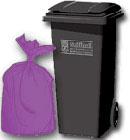
You can help us recycle by only putting clean recycling in your containers.
Cardboard can be flattened, folded or torn. Please remove any packaging such as polystyrene.
If your brown bin is full cardboard can be left alongside it but this needs to be flat and at a size that would have fitted into your bin. We will accept recycling in alternative containers such as your old recycling box or a hessian/jute bag. Please do not use carrier bags or black bin bags.
You can place glass bottles and jars in your brown bin or clear sacks. Our glass recycling page can help you understand what you can and cannot recycle.
Your recycling should still be loose in your bin so that it will fall out easily when it’s emptied.
Yes please:
- newspapers, magazines, telephone directories, catalogues
- junk mail, envelopes, greeting cards
- cardboard food boxes and egg boxes
- toilet or kitchen inner cardboard rolls
- corrugated card
- food and drink cartons such as juice, milk and soup
- household plastics such as drinks bottles, shampoo bottles, cleaning bottles, make-up cleanser bottles and washing up liquid bottles
- food and drink cans/tins
- food trays and tubs (e.g. fruit punnets, trays from microwave meals)
- yogurt pots
- aerosol cans
- clean foil
- paper wrapping paper (Not plastic or foil)
- glass bottles
- glass jars
- metal caps and lids from jars/bottles
- Crisp packets
- Sweet and biscuit wrappers
- Fruit and vegetable net bags
- Plastic bags (loose)
- Cheese, meat and fish wrapping
- Bubble wrap and cling film - max 1m sections
- Plastic film and sleeves
- Pouches

No thank you:
- shredded paper
- newspaper supplements still in plastic packaging
- greasy food packaging (e.g. pizza boxes)
- polystyrene
- plant pots
- food
- tissues and kitchen roll
- household waste
- cards with glitter or foil
- nappies
- metal i.e. cutlery or paint tins
- hard plastics i.e. CDs, DVDs, toys or sweet tubs
- clothes or textiles - these can be recycled through the small items collection
- wallpaper
- pyrex style glass
- drinking glasses
- broken glass
- light bulbs
- vases
- Vapes
- Batteries - these can be recycled through the small items collection
- Nitrous Oxide Bottles
If in doubt - check it out.


